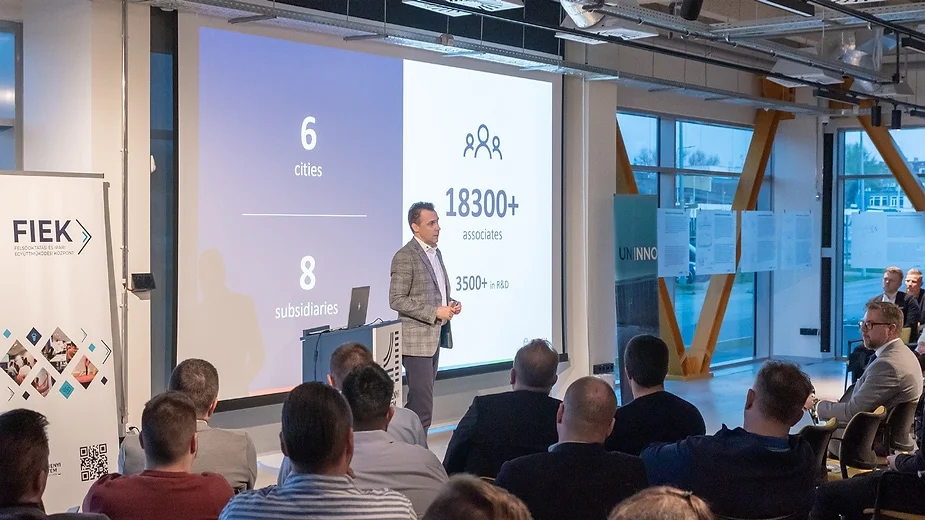Innovation and company entrepreneurship:
the top executive of the Bosch Group gave a lecture at Széchenyi University
Dr. István Szászi, Head of the Bosch Group in Hungary and the Adriatic region was the guest of the Spinoff Extra event at Széchenyi István University. The company is one of Hungary's largest employers and an important industrial partner of the institution. In addition to his own life story, the top manager also spoke about innovation, turning an idea into a product and leading a business to success.
The aim of the Spinoff Club series of events at Széchenyi István University is to connect people interested in business, entrepreneurship and innovation, and thus to create contacts that can lead to research and development projects or even start-ups. Building on this success, the team of the Centre for Higher Education and Industrial Cooperation has created the Spinoff Extra programme, which gives visitors the chance to meet a well-known and respected leader in the field.

The first guest speaker of the Spinoff Extra series of Széchenyi István University was Dr. István Szászi, Head of the Bosch Group in Hungary and the Adriatic region (Photo: András Adorján)
The guest of the first lecture, held in the University's Innovation Park in Győr, the Kocka, was Dr. István Szászi, Head of the Bosch Group in Hungary and the Adriatic Region. It was no coincidence that the opening programme of the series was a full house. "Dr. István Szászi graduated as a vehicle engineer, and after obtaining his PhD degree, he became an assistant professor and then an associate professor. During his industrial projects he gained insight into the exciting world of the business sector and continued his career on the corporate side. In 2004, he started his career as a project engineer at Bosch and after holding various management positions, he became the head of the Bosch Group in Hungary and the Adriatic region in 2021. He has almost 20 years of management experience, he is responsible for more than 23,000 employees, he is involved in mentoring programmes for managers, and his activities were recognised with the Gábor Dénes Award in 2023" - Dr. Szabolcs Rámháp, the host of the evening and a lecturer-researcher at the university introduced the guest.
"Initially, I was going to pursue a career in science, but I was lured by industrial projects, so I made the decision to join the Bosch Group in 2004.However, I never felt that I had broken off my academic life, as I used my previous research results in industry," said Dr. István Szászi. Regarding his workplace, he said that Bosch is the largest foreign industrial employer in Hungary, with the fourth highest net sales in the country, and its employees generate around three percent of GDP. On his own role, he said that in addition to Hungary, he oversees Bosch's sales units in Serbia, Croatia and Slovenia, as well as development activities in Romania and Bulgaria.

The main hall of the Innovation Park of the Széchenyi István University in Győr was full for the lecture (Photo: András Adorján)
"Our country is home to one of the company's largest R&D centres, where we are shaping the future of the automotive industry. We are working on projects that could define the next eight to ten years of vehicle manufacturing. Our vision is to become together an innovative technology partner in an ecosystem," he said. He said he is proud of what he and his colleagues have done to shape the ecosystem in recent years, because the company is interested in being successful not only on its own, but also with its partners.
The speaker highlighted the importance of innovation, which always starts from a socially and economically useful idea. He added that Bosch's basic philosophy is to only innovate in ways that make people's lives better. He explained that early Bosch developments such as the direction indicator or the windscreen wiper were still in-house innovations, but today the complexity of the developments requires a broader ecosystem. "These include the university, the presence of scientific research and agile start-ups that are able to respond quickly, or even spinoff companies from the university environment. In addition, it is important to work with the government, which can accelerate incubation processes," he listed. "To innovate, you need to know the field you are working in. If you want to turn an idea into a start-up, you need to know the business. You also need a framework to help you decide quickly whether or not the idea will become a product. The culture of innovation is also an important issue," said the speaker, who also stressed the importance of the corporate mindset and the environment that supports the creativity of employees. Among the company's focus areas, the speaker mentioned electric drive, self-driving technologies, IoT and artificial intelligence. As an example, he presented the various applications of video camera-based adaptive distance tracking systems to assist drivers in traffic. He stressed that these technologies are not just a convenience function, but also serve safety purposes, including avoiding hit-and-run accidents, and thus relate to Bosch's mission as mentioned earlier.
Finally, Dr. István Szászi also addressed students and researchers who are thinking about start-ups. In addition to the advice for them, he drew attention to the importance of thinking in teams, customer validation of a realistic business model and participation in the ecosystem, i.e. collaboration.











